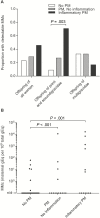Maternal Microchimerism Predicts Increased Infection but Decreased Disease due to Plasmodium falciparum During Early Childhood
- PMID: 28329160
- PMCID: PMC5790147
- DOI: 10.1093/infdis/jix129
Maternal Microchimerism Predicts Increased Infection but Decreased Disease due to Plasmodium falciparum During Early Childhood
Abstract
Background: A mother's infection with placental malaria (PM) can affect her child's susceptibility to malaria, although the mechanism remains unclear. The fetus acquires a small amount of maternal cells and DNA known as maternal microchimerism (MMc), and we hypothesized that PM increases MMc and that MMc alters risk of Plasmodium falciparum malaria during infancy.
Methods: In a nested cohort from Muheza, Tanzania, we evaluated the presence and level of cord blood MMc in offspring of women with and without PM. A maternal-specific polymorphism was identified for each maternal-infant pair, and MMc was assayed by quantitative polymerase chain reaction. The ability of MMc to predict malaria outcomes during early childhood was evaluated in longitudinal models.
Results: Inflammatory PM increased the detection rate of MMc among offspring of primigravidae and secundigravidae, and both noninflammatory and inflammatory PM increased the level of MMc. Detectable MMc predicted increased risk of positive blood smear but, interestingly, decreased risk of symptomatic malaria and malaria hospitalization.
Conclusions: The acquisition of MMc may result in increased malaria infection but protection from malaria disease. Future studies should be directed at the cellular component of MMc, with attention to its ability to directly or indirectly coordinate anti-malarial immune responses in the offspring.
Keywords: Childhood malaria; Malaria; Microchimerism; Placental malaria; Pregnancy..
© The Author 2017. Published by Oxford University Press for the Infectious Diseases Society of America. All rights reserved. For permissions, e-mail: journals.permissions@oup.com.
Figures


References
-
- World Health Organization. World malaria report 2015. Geneva, Switzerland: WHO, 2015.
-
- Brabin BJ, Romagosa C, Abdelgalil S, et al. The sick placenta-the role of malaria. Placenta 2004; 25:359–78. - PubMed
-
- Fried M, Duffy PE. Adherence of Plasmodium falciparum to chondroitin sulfate A in the human placenta. Science 1996; 272:1502–4. - PubMed
MeSH terms
Grants and funding
LinkOut - more resources
Full Text Sources
Other Literature Sources

